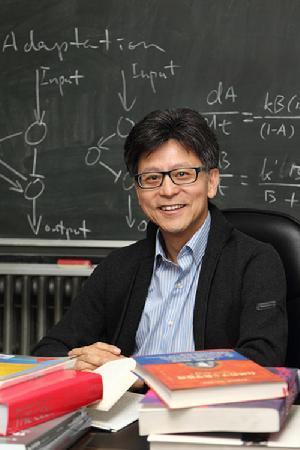Chao TANG
E-mail: tangc_at_pku.edu.cn
Website: http://cqb.pku.edu.cn/tanglab
Chair Professor, School of Physics, PKU;
Executive Dean, Academy for Advanced Interdisciplinary Studies, PKU; Director, Center for Quantitative Biology, PKU
|

|
Education:
B.S., University of Science and Technology of China, 1981;
Ph.D. Physics, University of Chicago, 1986.
Research interests:
We are interested in quantitative studies of biological systems. We apply, develop and integrate theoretical, computational and experimental methods and tools to address key biological questions. We believe that interdisciplinary approaches focusing on quantitative questions at systems level will gain new insights and uncover new principles in biological systems. Our current research areas include: relationship between function and topology in biological networks; design principles in cell cycle regulation; cellular decision-making; cell fate in development and reprogramming; microbial growth, metabolism and response to the environment; cellular oscillation in organs; application of information theory and artificial intelligence in biological systems.
Academic experiences:
Fellow, American Physical Society;
Academician, Chinese Academy of Sciences;
Advisory Board, Chinese Higher Education Press;
Board of Directors, Boulder School for Condensed Matter and Materials Physics;
Advisory Board, NSF Center for Theoretical Biological Physics, Rice University;
Scientific Advisory Board, Niels Bohr Institute, Denmark;
Scientific Advisory Committee, Kavli Institute for Theoretical Sciences, UCAS
Director, Guangdong-Hong Kong-Macau Center for Interdisciplinary Sciences
Founding Co-Editor in Chief, Quantitative Biology;
Editorial Board, Reports on Progress in Physics
1991-1998: Research Scientist, NEC Research Institute, Princeton, NJ;
1998-2005: Senior Research Scientist, NEC Research Institute, Princeton, NJ;
2005-2011: Professor, Department of Bioengineering and Therapeutic Sciences, and Department of Biochemistry and Biophysics, University of California, San Francisco;
2003-2011: Chang Jiang Jiangzuo (Guest) Professor, Peking University, Beijing, China;
2011-present: Chair Professor, School of Physics and Academy for Advanced Interdisciplinary Studies, Peking University.
Selected publications:
1. Li FT, Lu Y, Long T, Ouyang Q, Tang C. The yeast cell-cycle network is robustly designed. PROCEEDINGS OF THE NATIONAL ACADEMY OF SCIENCES OF THE UNITED STATES OF AMERICA, 101 (14), 4781 (2004).
2. Ma WZ, Trusina A, El-Samad H, Lim WA, Tang C. Defining network topology that can perform biochemical adaptation. CELL, 138, 760 (2009).
3. X. Yang, K.-Y. Lau, V. Sevim, and C. Tang, “Design Principles of the Yeast G1/S Switch,” PLoS Biol 11 (10): e1001673 (2013).
4. Shu J, et al. Induction of Pluripotency in Mouse Somatic Cells with Lineage Specifiers. Cell 153, 963 (2013).
5. Xin Wang, Kang Xia, Xiaojing Yang, Chao Tang*. Growth strategy of microbes on mixed carbon sources. Nature Communications 10: 1279 (2019).
6. Yimiao Qu, Jun Jiang, Xiang Liu, Ping Wei, Xiaojing Yang, Chao Tang. Cell cycle inhibitor Whi5 records environmental information to coordinate growth and division in yeast. Cell Reports 29: 987–994 (2019).
Group Member:
Xiaojing Yang